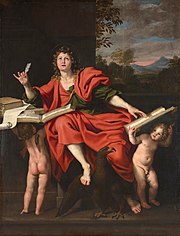Holy Spirit in Johannine literature
| Part of a series of articles on |
| John in the Bible |
|---|
 |
| Johannine literature |
| Authorship |
| Related literature |
| See also |

By the end of the 20th century, the theological importance of the
The terms
Three separate terms, namely Holy Spirit, Spirit of Truth, and Paraclete, are used in Johannine literature.[2] The "Spirit of Truth" is used in John 14:17, 15:26 and 16:13.[3] The First Epistle of John then contrasts this with the "spirit of error" in 1 John 4:6.[3] 1 John 4:1–6 provides the separation between spirits "that confesseth that Jesus Christ is come in the flesh is of God" and those who in error refuse it—an indication of their being evil spirits.[4]
In John 14:26 Jesus states: "But the Comforter, [even] the Holy Spirit, whom the Father will send in my name, he shall teach you all things". The identity of the "Comforter" has been the subject of debate among theologians, who have proposed multiple theories on the matter.[5]
Paraclete considered as the Spirit of Truth is used three times in the Gospel of John: in 14:15–17, 14:26, and 15:26–27, where it is viewed as the "Spirit which communicates Truth".[6] The concept of "truth" in Johannine writings is then intertwined with John 16:13's statement of how the Spirit of Truth acts as guide that leads believers to truth, building on the assurance given in John 14:26 that the Paraclete facilitates and confirms the memory of "all that Jesus had taught his disciples" and John 15:26's statement that "Spirit of truth, which proceedeth from the Father, he shall bear witness of me".[7]
References
- ISBN 0802801935pages 3-5
- ISBN 0881410810pages 1-5
- ^ ISBN 086554512Xpages xl-xlx
- ISBN 0814658121page 324
- ISBN 0802801935pages 14-21
- ISBN 0791430650pages 72-76
- ISBN 0802828221page 56
Bibliography
- ISBN 9781139054836.
- Bellinzoni, Arthur J. (25 February 2000). The Early Christian Community: From Diversity to Unity to Orthodoxy. Lecture delivered to the Wells College Faculty Club.
- Black, C. Clifton; Smith, D. Moody; Spivey, Robert A., eds. (2019) [1969]. "John: The Gospel of Jesus' Glory". Anatomy of the New Testament (8th ed.). S2CID 242455133.
- Byers, Andrew J. (2017). "Narrative Pneumatology and Triadic Theology: The Spirit-Paraclete as the Character Who Divinizes Beyond the Narrative". Ecclesiology and Theosis in the Gospel of John. ISBN 9781316823750.
- Doole, J. Andrew (March 2021). "To Be 'An Out-of-the-Synagoguer'". S2CID 228846103.
- Ferreira, Johan (1998). Johannine Ecclesiology. The Library of New Testament Studies. LCCN 98156774.
- Hill, Charles E. (2005). "Part III: The Evidence for a Johannine Corpus". The Johannine Corpus in the Early Church. OCLC 475098055.
- Hughes, Kyle R. (2020). How the Spirit Became God: The Mosaic of Early Christian Pneumatology. Eugene, OR: Cascade Books. ISBN 978-1-5326-9376-2.
- Koester, Craig R. (2015). Revelation: A New Translation with Introduction and Commentary. ISBN 9780300216912.
- ISBN 9780199645831.
- Ong, Hughson T. (2015). "The Gospel from a Specific Community but for All Christians: Understanding the Johannine Community as a "Community of Practice"". In ISSN 2214-2800.
- ISBN 9781444318937.
- S2CID 171267332.
- Williams, Catrin H. (2018). "Faith, Eternal Life, and the Spirit in the Gospel of John". In de Boer, Martinus C.; LCCN 2018947872.
